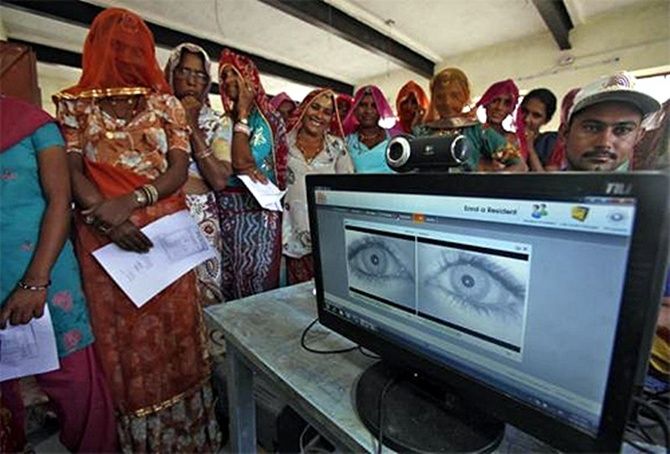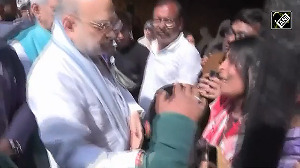The verdict in the Right to Privacy case establishes dharma, righteousness, and destroys adharma, the evil acting on behalf of the universal principal 'I' mentioned in the Bhagavad Gita, says Gopal Krishna.

Having read the orders of Justices Rohinton F Nariman and Dr D Y Chandrachud on the right to privacy case, Justice Sanjay Kishan Kaul authored a separate but a concurring 47-page order as part of the nine-judge Constitution Bench of the Supreme Court.
He underlines, 'This reference has arisen from the challenge to what is called the 'Aadhaar card scheme', referring to the biometric profiling based scheme of Central Identities Data Repository of Aadhaar numbers.'
Significantly, Justice Kaul raises the question of dharma (justice) and adharma (injustice) in his order.
He writes: 'It is wrong to consider that the concept of the supervening spirit of justice manifesting in different forms to cure the evils of a new age is unknown to Indian history.'
He recalled the Sanskrit verse of Chapter 4 of the Bhagavad Gita to underline that ‘the meaning of this profound statement, when viewed after a thousand generations is this: That each age and each generation brings with it the challenges and tribulations of the times.'
'But that supreme spirit of justice manifests itself in different eras, in different continents and in different social situations, as different values to ensure that there always exists the protection and preservation of certain eternally cherished rights and ideals.'
'It is a reflection of this divine ‘brooding spirit of the law', 'the collective conscience’, ‘the intelligence of a future day’ that has found mention in the ideals enshrined in inter alia, Article 14 and 21, which together serve as the heart stones of the Constitution.’
The significance of the Bhagavad Gita verse which Justice Kaul cited in his order becomes more evident if it is read with its preceding, very famous, verse: ‘Yada Yada hi dharmasya, glanirbhavati bharata; abhyutthanam adharmasya, tadaatmanam srujamyaham.’
The subsequent verse reads: ‘Paritranaaya sadunaam, vinashayacha dushkritaam; dharmasansthaapanarthaya sambhavami yuge yuge.’
Together they mean: 'Whenever righteousness declines and unrighteousness is rampant, I manifest myself. I manifest myself from age to age to defend the pious, destroy the wicked and strengthen righteousness.'
Notably, Justice Kaul traces the origin of Article 14 (right to equality before law) and 21 (right to protection of life and liberty) of the Indian Constitution in the Bhagavad Gita.
It is evident that his order refers to government's position on the right to privacy in the scheme of CIDR of Aadhaar numbers as adharma, or evil.
He factors in the contemporary and historical context of human identification and profiling.
The verdict in this case is historic and of global significance because it establishes dharma, righteousness, and destroys adharma, the evil acting on behalf of the universal principal ‘I’ mentioned in the Bhagavad Gita.
He observes, 'It cannot be said that a person should be profiled to the nth extent for all and sundry to know', something which is being done under the Aadhaar scheme.
He cites the European Union Regulation, 2016, on data privacy that deals with the protection of natural persons with regard to the processing of personal data and on the free movement of such data.
The Regulation defines 'profiling' as any form of automated processing of personal data, consisting of the use of personal data to evaluate certain personal aspects relating to a natural person, in particular to analyse or predict aspects concerning that natural person's performance at work, economic situation, health, personal preferences, interests, reliability, behaviour, location or movements.
'Such profiling can result in discrimination based on religion, ethnicity and caste,' it says.
This is what the predecessors of Adolf Hitler did in Germany.
Prior to the arrival of the Third Reich, the German government had hired the services of IBM, a United States-based company which was in the ‘census’ business, including racial census that entailed not only counting the Jews but also identifying them.
As a result, when Hitler came to power, he had the lists of Jewish names based on profiling during the census. The Nazis inherited these lists from the previous government.
At the US Holocaust Museum in Washington, DC, there is an exhibit of an IBM Hollerith D-11 card sorting machine that was responsible for organising the census of 1933 that first identified the Jews.
IBM has not disputed its involvement in the exercise. It merely said that its subsidiary in Germany was beyond its control, a fact which has been highlighted in the book IBM And The Holocaust.
If this is not adharma, what else is?
Dwelling on the subject of 'the right to be’ or right to privacy before recollecting the words of the Bhagavad Gita, Justice Kaul cited the words of Lord Acton contained in The History Of Freedom And Other Essays published in 1907 wherein he said, 'The sacred rights of mankind are not to be rummaged for among old parchments of musty records. They are written, as with a sunbeam, in the whole volume of human nature, by the hand of divinity itself, and can never be obscured by mortal power’.
Drawing on such eminent resources Justice Kaul observes, ‘Privacy is an inherent right. It is thus not given, but already exists’ and adds that privacy ‘is nothing but a form of dignity, which itself is a subset of liberty’.
He further observes, ‘Privacy is also the key to freedom of thought. A person has a right to think.’
Notably, the mind is the name given to the sequence of thoughts and in fact it is the human mind which takes birth, grows and governs human life.
Taking note of the concerns expressed regarding Aadhaar scheme 'infringing the right to privacy', he has suggested tests 'for limiting the discretion of the State'.
These tests include ascertaining whether the proposed action is 'necessary in a democratic society for a legitimate aim', the 'extent of such interference' is 'proportionate to the need for such interference', whether there are 'procedural guarantees against abuse of such interference' and whether actions such as seeding of UID/Aadhaar number with citizens’ social entitlements and existing databases is 'sanctioned by law'.
There is sufficient evidence to establish that this scheme fails in all the four tests because the aim itself is unnecessary and illegitimate, entails disproportionate and unlimited interference and the 'procedural guarantees' do not meet the test of natural justice because of provisions like deactivation of UID numbers which results in 'civil death'.
Against such a backdrop, disclosures made in 2010 in a release by the Centre (external link) bearing the subject 'approach paper for a legislation on privacy', assumes great relevance.
It seemed to underline the virtues of databases which are in disconnected silos -- which ensure privacy -- and information is made available on a need-to-know basis.
Convergence of databases as envisaged in the scheme of CIDR of UID/Aadhaar numbers through seeding, which was inherited and adopted by the Bharatiya Janata Party-led government from the previous United Progressive Alliance government, results in death of privacy.
It has been admitted officially that 'data privacy and the need to protect personal information is almost never a concern when data is stored in a decentralised manner. Data that is maintained in silos is largely useless outside that silo and consequently has a low likelihood of causing any damage.
'However, all this is likely to change with the implementation of the UID project. One of the inevitable consequences of the UID project will be that the UID number will unify multiple databases.
'As more and more agencies of the government sign on to the UID Project, the UID Number will become the common thread that links all those databases together. Over time, private enterprise could also adopt the UID number as an identifier for the purposes of the delivery of their services or even for enrollment as a customer.
'Once this happens, the separation of data that currently exists between multiple databases will vanish.'
The document reveals that 'private detective agencies, if allowed to operate without regulation, could potentially wreak considerable havoc on the personal information of a citizen'.
The information obtained under Right to Information reveals that private foreign agencies involved in CIDR of UID/Aadhaar have been operating as part of their 'business of private surveillance' without regulation for quite a long time.
They are helping in the creation of 'an identifiable profile of everyone on that public database' which includes personal sensitive information like racial or ethnic origin, political affiliations or opinions, religious affiliations and beliefs or other beliefs of a similar nature, membership of a trade union, physical or mental health or condition, sexual life and criminal record.
Besides these, it also includes genetic information about an individual that is not otherwise health information, information or an opinion about an individual, financial or proprietary confidential corporate data, data on a person's personality, private family relations, biometric data, social welfare needs of a person or the benefits, support or other social welfare assistance received by the person; and data collected on a person during the process of taxation.
Justice Kaul has agreed with the concerns of the petitioners against UID technology that 'the technology has made it possible to enter a citizen's house without knocking at his/her door and this is equally possible both by the State and non-State actors'.
He underlines that 'if the individual permits someone to enter the house it does not mean that others can enter the house. The only check and balance is that it should not harm the other individual or affect his or her rights', reacting to the argument that if citizens have shared data with some digital companies, they should not be reluctant to share for biometric profiling by Unique Identification Authority of India.
He concurred with other judges who held that that the right of privacy cannot be denied, even if there is a minuscule fraction of the population which is affected. The majoritarian concept does not apply to Constitutional rights.
Drawing on Daniel Solove's 10 Reasons Why Privacy Matters (external link), Justice Kaul observes, 'An individual has a right to protect his reputation from being unfairly harmed and such protection of reputation needs to exist not only against falsehood but also certain truths.
'It cannot be said that a more accurate judgment about people can be facilitated by knowing. private details about their lives -- people judge us badly, they judge us in haste, they judge out of context, they judge without hearing the whole story and they judge with hypocrisy.
'Privacy lets people protect themselves from these troublesome judgments.'
He cites the poetic words of Felicia Lamport in his order. It is titled Deprivacy and reads as:
Although we feel unknown, ignored,
As unrecorded blanks,
Take heart! Our vital selves are stored
In giant data banks,
Our childhoods and maturities,
Efficiently compiled,
Our Stocks and insecurities,
All permanently filed,
Our tastes and our proclivities,
In gross and in particular,
Our incomes, our activities,
Both extra-and curricular.
And such will be our happy state,
Until the day we die,
When we’ll be snatched up by the great,
Computer in the sky.
This poem was published by The University of Michigan Press in The Assault on Privacy by Arthur R Miller.
Justice Kaul observes, 'The impact of the digital age results in information on the internet being permanent. Humans forget, but the internet does not forget and does not let humans forget. Any endeavour to remove information from the internet does not result in its absolute obliteration. The footprints remain.
'It is thus said that in the digital world preservation is the norm and forgetting a struggle'.
He refers to the European Union Regulation of 2016 that has recognised 'the right to be forgotten', which means that an individual who is no longer desirous of his personal data to be processed or stored, should be able to remove it from the system where the personal data/ information is no longer necessary, relevant, or is incorrect and serves no legitimate interest.
He has recommended that 'privacy of children will require special protection not just in the context of the virtual world, but also the real world'.
Drawing on European Union Regulation of 2016 on the protection of natural persons with regard to the processing of personal data and on the free movement of such data, in concurrence with Justice Chandrachud, he has directed 'the State must ensure that information is not used without the consent of users and that it is used for the purpose and to the extent it was disclosed'.
Drawing on the findings of the government's Group of Experts on privacy under the chairmanship of Justice A P Shah, he observed, 'The concerns about privacy have been left unattended for quite some time and thus an infringement of the right of privacy cannot be left to be formulated by the legislature'.
It is noteworthy that he concurred with the view that the majority judgment in the case of ADM Jabalpur vs Shivkant Shukla 'was an aberration in the constitutional jurisprudence of our country and the desirability of burying the majority opinion ten fathom deep, with no chance of resurrection'.
Having taken this position, this otherwise good order seems to display its imperfection from the philosophical point of view when Justice Kaul deviates to say, 'However, no right is unbridled and so is it with privacy.'
He goes on to say that while 'the right of an individual to exercise control over his personal data and to be able to control his/her own life would also encompass his right to control his existence on the internet', but adds 'needless to say that this would not be an absolute right'.
He reiterates, 'The right to privacy as already observed is not absolute' by referring to 'national security' and 'public interest'.
While these words have the meaning which the State gives to them, in exceptional circumstances, reasonable restrictions have compelling logic but such restrictions cannot be made applicable indiscriminately.
Exceptional circumstances cannot make an absolute natural right less absolute for 'we, the people'.
In ADM Jabalpur case, a majority of four judges of the court (with Justice H R Khanna dissenting) held that: 'Liberty is confined and controlled by law, whether common law or statute. It is in the words of Burke a regulated freedom. It is not an abstract or absolute freedom', incorrectly assuming that the Constitution was the sole repository of the right to life and liberty.
Given the fact this verdict has been overruled and needs to be 'ten fathom deep, with no chance of resurrection', how can it be inferred that right to privacy as part of right to life and personal liberty is not an absolute right?
Human life is a gift of privacy of our ancestors, our mother and father. Will human beings dare say to their parents that they do not have an absolute right of privacy?
Will Mother India tell her children that they must be exposed to public at large like animals? Who will have the heart to their children and grandchildren that they do not have this right?
The Centre -- through the then attorney general, several state governments like Haryana, Maharashtra and Rajasthan, the UIDAI, the Telecom Regulatory Authority of India and Vidhi Centre for Legal Policy -- showed the audacity to do so. But have been roundly repulsed by the Supreme Court for their questionable stance.
But now that the Constitution Bench has unequivocally held that 'the judgments rendered by all the four judges constituting the majority in ADM Jabalpur are seriously flawed. Life and personal liberty are inalienable to human existence', it follows that right to privacy being an intrinsic part of it is an absolute right, subject to deviation only in rare and exceptional circumstances.
There is a compelling logical compulsion to recognise it to be so in the era of 'de-privacy' to prevent permanent destruction of the quietude and serenity of the human mind.
This is the first in a 7-part series.
Part 2: Right to Privacy and the Bhagavad Gita
Gopal Krishna is convener, Citizens Forum for Civil Liberties, which is campaigning against surveillance technologies since 2010.







 © 2025
© 2025